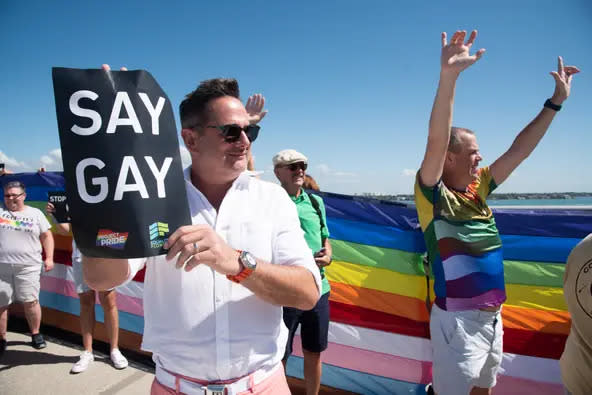Thursday's letters: Resist LGBTQ fearmongering, require developers to fund artwork
- Oops!Something went wrong.Please try again later.
- Oops!Something went wrong.Please try again later.

Need LGBTQ education, not censorship
Bravo on the Jan. 1 Herald-Tribune editorial, “It’s time to end harmful anti-LGBTQ rhetoric.”
Opinion:End anti-LGBTQ rhetoric across Florida
Florida is walking dangerously close to the Dark Ages when it comes to LGBTQ propaganda. People fear what they do not understand. So, we need more education, not censorship.
Gov. Ron DeSantis is abusing the power of Florida’s governorship in several areas in which he is inexperienced and/or ignorant. Let teachers teach. Let doctors, doctor. Let parents of every category do what they believe to be in the best interests of their children.
More:How to send a letter to the editor
Resist fearmongering about things that are not yet well understood.Karle Murdock, Sarasota
Acceptance, not encouragement
Opinions Editor Roger Brown, in his Jan. 1 editorial, admonishes us to end “anti-LGBTQ” rhetoric while outlining, among other items, Gov. Ron DeSantis’ drag queen investigations (“It’s time to end harmful anti-LGBTQ rhetoric”).
I believe Brown misses the difference between “acceptance” and “encouragement.” This fine line of demarcation is at the heart of much criticism of the “LGBTQ movement.”
Perhaps more specifically, the concern pertains to encouraging juveniles to accept their “sexual direction” at a most vulnerable and confusing time in their personal development.
One does not necessarily harbor ill feelings toward the community as it is self-described in order to be concerned regarding the direction of certain individuals, society in general and school systems, in particular, toward encouraging our students to move toward a direction of gender selection at a time in their lives when they are least able to make lifelong decisions.
This extends to the point where even identifying someone by gender is considered an “attack.”
Thus, much of the rancor is the product of a perception that acceptance is not sufficient, and encouragement, even at a young age, is the only acceptable path.
Lee Hoffman, Lakewood Ranch
Sarasota faces public art dilemma
The new roundabout at U.S. 41 and Gulfstream Avenue needs an important sculpture in the center. The John Henry “Complexus” sculpture, now on the Sarasota Art Museum lawn at the old high school, must come back.
More:Unconditional Surrender and Complexus to move
Sarasota has a reputation as an art and cultural hub – yet it now faces a public art dilemma. Funds for sculpture come from construction budgets. With new construction, the Public Art Committee has funds for art.
But where will it end? How many new buildings can developers build? Will public space disappear? Will the personality of the town change?
Moreover, Public Art Committee funds must increase. We used to spend $150,000 for sculpture; now we’re at $175,000 – which is still less than what important, world-class sculpture can cost.
For example, the Boaz Vaadia sculpture at Ringling Boulevard and Golf Street cost $200,000 some years ago, and significant work can cost $250,000 or more.
Sarasota must keep pace with universal standards. To attract the tourists and residents we seek, Sarasota must present a product worthy of our reputation.
We want people to come for the art as well as the beaches.
If developers want to continue to build, they must produce the funds for art. Otherwise, what do we get for all those extra condos and hotel rooms?
Jeffrey Weisman, Sarasota
Weisman served as chairman and vice chairman of the Public Art Committee during both of his three-year terms.
Americans born with right to self-defense
Guest columnist Richard Alba mistakenly credited Justice Antonin Scalia, in District of Columbia v. Heller, with establishing “for the first time an individual right to gun ownership” (“Our conservative Supreme Court’s rulings on guns damage survivors,” Dec. 28).
The right of self-defense (with weapons, how else) needs no permission from the Supreme Court or the Second Amendment. In Heller, Justice Scalia confirmed it is a “preexisting, inherent” right we acquire just by being born.
The federal courts, including the Supreme Court, tell us that the local police − government − have no legal obligation to us as individuals to protect us from harm by others. If no one has to protect us from personal threat, why should government have a veto over how we protect ourselves with whatever means necessary?
Justice Scalia recognized that the right to protect ourselves includes confronting government tyranny, and the Second Amendment recognizes that would necessitate citizens bearing their arms in a militia; for that, a single-shot musket or even a multishot Glock won’t do.
Germany, Cuba and Venezuela disarmed their citizens before taking their freedom away. The English tried and failed to disarm the colonists, who then won their freedom.
The Second Amendment wouldn’t have us risk our lives or our freedom. Neither should we.
John A. Lanzetta, Sarasota
This article originally appeared on Sarasota Herald-Tribune: Allow acceptance, without encouragement, of LGBTQ movement
